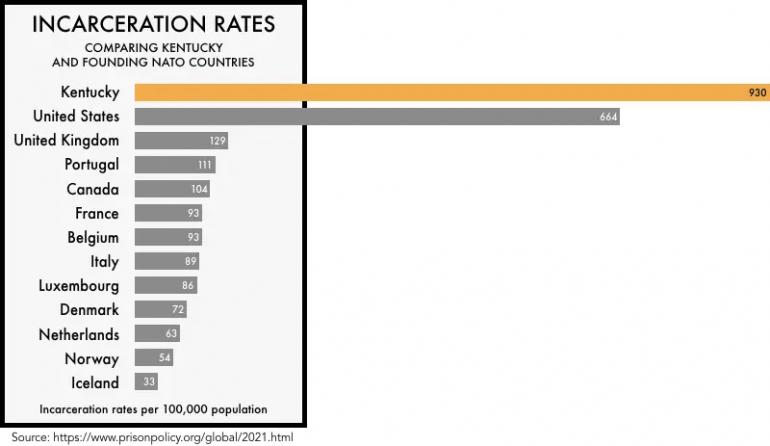New Collaboration Brings Translational Science to Criminal Justice Continuum

Lexington, Ky. (Jan. 4, 2022) — The United States imprisons a larger percentage of its population than any other country on Earth. Of the 10.35 million people incarcerated throughout the entire world, 2.3 million (more than 20 percent) are held in U.S. prisons and jails—a 500% increase over the last 40 years, and a veritable public health crisis. Kentucky has one of highest rates of incarceration in the nation, at 930 per 100,000 people compared to the national average of 664 per 100,000.
Researchers at the University of Arkansas for Medical Sciences (UAMS), the University of Kansas Medical Center (KUMC), and the University of Kentucky (UK) are teaming up to develop a new Clinical and Translational Science Award (CTSA) research network to support translational science across a criminal justice continuum that impacts millions of lives.
Criminal justice settings provide an opportunity to engage difficult-to-reach populations who have significant underlying health conditions, including a high burden of chronic and infectious diseases and behavioral health disorders. However, few public health interventions are specifically tailored to be delivered within criminal justice settings or with individuals involved in the criminal justice system, and only a fraction of NIH grants focus on criminal justice related health research.
“I’m very excited that UAMS will be participating in this unique collaboration to address the pressing public health challenges among people involved in the criminal justice system,” said Nick Zaller, PhD, Professor of Health Behavior and Health Education at UAMS. “By establishing a network of CTSA institutions to support this work, we will be able to develop a national model for research to improve the lives of those most impacted by incarceration in the United States.”
This project will leverage the existing clinical and translational research infrastructure at the three partnering institutions through their respective Clinical and Translation Science Award (CTSA)-funded units. The researchers expect the proposed network to have a profound impact on the future direction of research involving this underserved population.
“I am thrilled that this project brings together new friends and collaborators to really make a mark in the field of criminal legal system research and public health,” said Megha Ramaswamy, PhD, MPH, Professor of Population Health at KUMC. “We hope to work on research that benefits the 13 million Americans who pass through jails every year. Doing so through the CTSA infrastructure should only boost our reach in this effort.”
The network will also be used to develop new investigators and support established ones in the development and implementation of research on the health of criminal justice-involved individuals across CTSA institutions through facilitation of multidisciplinary research collaborations.
“I am really excited to be a part of this project because justice-involved individuals are often among the highest risk for health and behavioral health issues, yet evidence-based interventions often neglect this population” said Michele Staton, PhD, Professor in the Department of Behavioral Science at the University of Kentucky. “I also love the idea of being a part of the development of a CTSA research network supporting both translational science across the criminal justice continuum and resources for other investigators to initiate or advance their own criminal justice research.”
The project is being funded by the Consortium of Rural States (CORES) Research Collaborative Inter-Institutional Pilot Project Award program, which gives funding priority to projects addressing issues of disparities either because of rurality or underrepresented and disadvantaged groups.
“There are a number of unique challenges to conducting research with justice-involved individuals and/or working in justice settings,” Staton said. “This grant provides a tremendous opportunity to build capacity for translational research, as well as expand critical health and behavioral health interventions to some of the most vulnerable individuals.”
The Inter-Institutional Pilot Project Awards promote collaboration across the CTSA consortium by funding innovative, translational research projects that involve three or more of the institutions that make up the CORES Research Collaborative: University of New Mexico Health Sciences Center; University of Kansas Medical Center; University of Kentucky; University of Arkansas for Medical Sciences; University of Iowa; and the University of Utah Health. The CORES program is funded as part of the CTSA through the National Center for Advancing Translational Sciences of the National Institutes of Health.
“Individuals in the criminal justice system comprise a seriously under-appreciated and under-represented population that has significant and unique medical challenges. Moreover, these issues are understudied, in large part due to the difficulty in accessing potential participants and from the historical abuse of prisoners in research,” said William M. Brooks, PhD, Associate Director of Frontiers and Director of the Frontiers Pilot Awards Program. “This CORES-funded grant will help build vital infrastructure to carry out research to better understand the problems, test solutions, and ideally lead to reduced social and financial costs to the community at large. Involving three states, Arkansas, Kansas and Kentucky, will better represent the diversity of incarcerated populations and result in more generalizable outcomes.”
Additionally, the Journal of Clinical and Translational Science (JCTS), an open access journal whose mission is to provide a forum for disseminating advances in clinical and translational science, has offered the study team a special issue, focusing on the theme “Health and Social Drivers in the Criminal Justice System.” Submissions are due in March 2022.
“We are really excited the Journal of Clinical and Translational Science will dedicate this special issue to our project and research in the criminal justice system,” Ramaswamy said. “Disseminating research results is key to the success and sustainability of any project, but especially one like this one as we build this nationwide network.”
Media Contact: Mallory Profeta, mallory.profeta@uky.edu
The UK CCTS is supported by the NIH National Center for Advancing Translational Sciences through grant number UL1TR001998. This content is solely the responsibility of the authors and does not necessarily represent the official views of the NIH.